
Solo Hiking
Is Solo Hiking for You?
Take a look at the two images. Which looks more appealing to you?
an empty trail ahead or a few people with you?
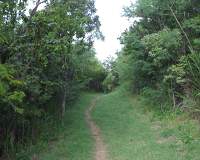
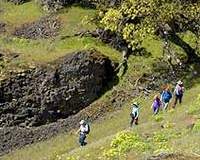
We humans are social animals. We normally prefer others around us and enjoy sharing experiences with others.
In some situations, some of us like to experience the world alone. If the empty, open trail beckons to you, then solo hiking might be what you're looking for.
Deciding to solo hike or not is completely your decision. Whether you go out alone, with a couple friends, or with a large group there are potential consequences with which you need to be prepared to deal.
Check out recent Lost Hikers and Deaths.
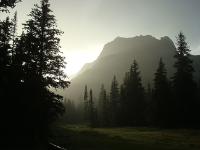
Benefits of Solo Hiking
Being out on the trail all by yourself can be very rewarding in many ways:
- Spiritual Health - Solitude allows time for self-examination, relaxation away from the rat race for awhile, and a chance to meditate, contemplate, or just zone out for miles at a time.
- Outdoor Skills - When part of a group, it is easy to rely on the skills of others to find your way, cook your food, keep you safe, and make all the tough decisions. Solo hiking relies on your own skills and knowledge. Ensuring you have the skills before going solo is key.
- Own Pace - A group can only move as fast as its slowest member. That means everyone is either going faster or slower than they would like to be. A solo hiker moves as fast as he desires and can alter his pace whenever he wants.
- Flexibility - Changes to your pace, camping location, route, rest breaks, and everything else having to do with the hike can be made as you want. There's no group buy-in required so you can hike your own hike. When significantly altering your route, it's important to inform someone of your new plans, just in case you need to be found.
- Challenge - Push yourself to hike faster, farther, or longer hours than you're used to. Build up to more difficult trails, uncomfortable weather, and rough environments.
- Meet your Fears - Many of us have fears that have little basis. Whether you're afraid of wild animals, heights, darkness, storms, being alone, or whatever, a solo hike can help you overcome those fears.
- Meet Nature - Hiking with a group, especially youth, there is not much hope of seeing any real wildlife. The noise, smell, and general invasion will drive most everything away. Just a short hike alone in the early morning will allow you to see many kinds of animals - a longer solo hike gives you even more opportunity.
Any bit of nature that interests you can be observed. The group won't let you sit and watch flowers, butterflies, waterfalls, clouds, animal tracks, or falling leaves for long. Out on your own, you can spend your hours however you like. - Responsibility - The solo hiker can say "I did it myself" when finished. Responsibility for the success of the adventure is completely his, as is the pride of completion. Along the way, responsibility for minimizing impact, caring for the trail, staying safe, and being self-sufficient is also his alone.
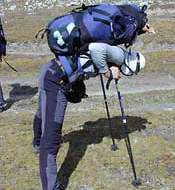
Concerns of Solo Hiking
Travel alone does have some potential drawbacks which you should address long before stepping foot on the trail:
- Loneliness - The mental drain of isolation is a huge drawback to solo hiking. Long distance trail hikers fail to finish because of injury, poor planning, but most often because of loneliness - the days with no one to talk with become long and boring. Honestly assessing how this will affect you and how you'll deal with it is a crucial planning step. Will an electronic music player or book reader keep you sane? Do you enjoy being alone for days at a time already?
This is different than living in an apartment alone. On the trail, there's no city noise, background traffic, or other white noise that lets you know you're in civilization. - Heavy Heart - With someone else around, they can encourage and support you when you're feeling down, tired, or grumpy. When it's just you, a bad case of the blues might be enough to send you off the trail and back home. This is the bane of thru-hikers.
- Heavy Load - No one will be around to carry part of the gear. It's all on your shoulders. But, since there's only one person, there should be very little extra gear. Your shelter, kitchen, water treatment, first aid kit, and navigation items could be split among multiple people, but the rest increases directly as the group size grows.
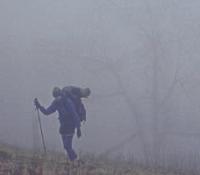
Real Dangers
Whether alone or not, there are real dangers of being in the wild. Being prepared to deal with these is your responsibility when heading out:
- Getting Lost - With no one to check your map reading and direction finding, losing your way is the most common problem for solo hikers. Just take a look at the Lost Hikers recent news and you'll see that it happens often. Learn all about wilderness navigation and practice it often before setting out on your own. There's a good beginner site at Compass Dude to start you in the right direction :-)
Global Positioning Systems (GPS) are handy and efficient, but a map and compass should always be ready as a backup. Even with good navigation skills, nature can turn you around with wind, blizzards, fog, overgrown paths, and snow cover. Still the best thing to do when lost is S T O P - Stop Think Observe Plan.
Whatever you do, don't expect your cellphone to save you. - Humans - Human attacks are a potential problem, especially for solo female hikers. The closer to populated areas you hike, the more probable you'll encounter a weirdo. Be friendly but not outgoing to people you meet. Give an impression that your hiking partner should be along soon. Pepper spray might be something to take with you if you are concerned with strangers.
- Animals - Animals may attack you in order to protect themselves, their young, or their food. Keep your eyes and ears open.
Large animal attacks, such as bear, cougar, or wolf are extremely rare. If you hike in their habitat, take some time to educate yourself on their behavior and how you should handle yourself. Hear are a couple starter pages about bears, cougars, wolves.
Eating your meal on the trail a mile before you set up camp and then storing your smellable items securely solves most problems.
You will more likely be bothered by insects, rodents, or an occasional snake. Insects bite, sting, and bother enough to make a hike completely miserable. Timing a hike to evade dusk and dawn, wearing appropriate clothing or netting, and using insect repellent will take care of most insects. Being careful not to disturb nests or hives is also a good idea.
You might come across a snake sunning in the trail. Keep your eyes and ears open. If you encounter one, give it a wide berth and wait for it to slither off the trail. If you get bit, use your first aid skills to treat the bite and get to medical help.
Most probably, you will have problems with mice, chipmunks, or raccoons seeking out your food. They can quickly chew through your pack and cause a real mess. Store your food and pack securely to prevent this problem. - Natural Events - Wind, rain, snow, lightning, sun, flood, earthquake, falling rocks, falling trees, wildfire - a long list of natural events that can be annoyances or catastrophies. Knowing how to read the weather is an important skill. Having proper gear to protect from adverse weather makes sense. Make camp in safe areas - not on high places, open places, close to cliffs, under large limbs, or close to creeks.
There is little you can do about some natural events, such as earthquake, tsunami, or wildfire, but you can do some disaster preparedness. - Injuries - No matter how well you prepare nor how careful you are, an injury is always a real possibility in the wild. As long as you hike steadily on a well-groomed trail, the risk is minimal. But, rough terrain, water crossings, rock scrambling, cooking, and other risy tasks can result in stumbles and falls, burns, and cuts. Of course, an adequate first aid kit is an essential part of any hiking pack but the knowledge on how to use it and how to improvise other aid is even more essential. Before going solo, Wilderness First Aid training should be completed. You'll be the only one around so you'll need to know what to do and how to do it.
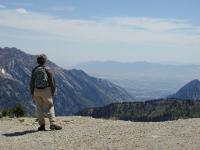
Solo Hiking Advice and Tips
OK, so there's good reasons to go solo, things that might make it not so fun, and some trouble you can get into. How about a few tips and tidbits to help keep you safe when you finally decide to give solo hiking a try:
- Be realistic about your skills, pain threshold, endurance, and what you enjoy. If group hiking is more fun, stick with that.
- Think of yourself as a person that you are with - you are not alone, you are with yourself! You can share the nature you see, hear, taste, and feel with yourself. You will have the memories of your experiences forever and you can recall them any time.
- Make your hike FUN and SPECIAL - take a chunk of chocolate for a break at 5 miles, or plan on an ice cream sundae when you make it to the next town.
- Know the area where you will hike - research weather patterns, trails, bailout points, wildlife range, elevations, water sources, private properties.
- Stay on the Trail - cross-country travel can be exciting but damages the environment and makes it difficult to find you, just in case.
- Take baby steps - short day hikes, overnighter trips, weekend outings, week-long backpacking, then long distance treks.
- Become confident - this is different than arrogant. Arrogance is an attitude of superiority while confidence is faith that you will act in the right way because you have skills. Read, ask questions, practice skills, take baby steps, know how to use your gear, and finally take longer hikes.
- Think through "What If" scenarios - what if the campsite is occupied, the stove breaks, the water filter breaks, my foot breaks, I lose my map or drop my compass, a bear/wolverine/cougar crosses my path or enters camp, the trail is closed, it rains for 1, 2, 3, 4 days, it snows, ... Don't waste time on farfetched scenarios, like snow in Florida on a June hike, but work your way through everything you can think of that might go wrong.
- Make detailed plans - trail maps, weather forecast and seasonal weather, food requirements, expected mileage, and day-to-day plans will ensure you have longer hikes well planned.
- Leave a travel itinerary with someone back home. Check in with a ranger station or other land manager at or near the trailhead and tell them your plans.
- Think each trip through in your mind - using topo maps or Google Earth, visualize how you'll be hiking along, where the steep sections are, where there's forest, meadow, sage, or rock, when you'll be on a windy, open ridge or in a sheltered woods.
- Get a feel for direction - at any point in time, you should be able to say, "North is that way" and be generally correct. Feeling the time of day and general direction of the sun is all it takes. Understanding where you are on your map, knowing where you want to be going, and having a feel for your direction will alert you to "something's not right" quickly if you take a wrong turn.
This sense of direction is very difficult for some - if that's your case, you might be better off not going solo. - Read trail journals of past hikers. Learn from their experiences and try to visualize yourself in their situations.
- Use a tracking or signaling device. Spot Messenger or DeLorme InReach are two electronic devices that tell folks back home where you are and allow you to send Check-In or Help messages.
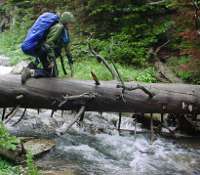
All Comments:
Apr 08, 2013 - kat o
Jun 06, 2013 - sleeps with bears
Jul 22, 2013 - Casi
Nov 22, 2013 - whawley
Jan 04, 2014 - Gary Robertson
Jul 30, 2014 - Christian Pedersen
Aug 01, 2014 - Susann
Aug 05, 2014 - doghiker
Oct 04, 2014 - DENNIS
Oct 26, 2014 - waterbuffalo
Oct 27, 2014 - KAL
Dec 30, 2014 - MNRC
Dec 30, 2014 - Hiking Dude
Mar 14, 2015 - Terry Smithers
Apr 06, 2015 - Alicia
Apr 06, 2015 - Hiking Dude
May 15, 2015 - JP
May 15, 2015 - Hiking Dude
Jun 05, 2015 - Nikki
Jul 08, 2015 - Udi
Aug 14, 2015 - Kathryn Clabo
Aug 23, 2015 - Trihakni Putra
Aug 30, 2015 - Leah Harper
Sep 08, 2015 - Alyssa P
May 20, 2016 - Paula
Anyway, while hiking in the area I discovered that there are primitive campsites there. So when I got home I did some research and got all worried and bummed that I "shouldn't" hike alone. So, thanks again for the education and tips on how to solo-hike with confidence and safety whether you are a female or a male!
May 25, 2016 - Jon
All that being said, for people of a certain temperament solo hiking is far superior.
May 25, 2016 - Ruth
Power to all you solo female hikers!
Jun 17, 2016 - Gilbert Benjamin
Jul 08, 2016 - Germán
Jul 17, 2016 - Mindau
Jul 20, 2016 - Shawn
Aug 08, 2016 - Marieke
I really love hiking, usually I go with a friend of mine. Never with a large group of people because we both like being alone but we also both know that solo hiking can be dangerous for young girls (18 and 19) and also that when you spend several days alone (even the biggest introvert) you feel very lonely.
There is just one thing, this year I'm taking a year off, I want to see other things, to travel and above all to figure out want I want to do when I grow up so I thought I'd go hiking in Ireland or Spain. Just one problem, my hiking friend goes to college, so I'm alone!!!
Maybe there is some site or something like that to meet people to go hiking with... if anyone knows anything like that,it would be great!
(And if it doesn't exist... well it could be a great idea for some hiking blogger to start that!)
Aug 09, 2016 - Hiking Dude
Pretty much any long distance hiker will tell you to just GO and you will meet people on the trail, some of which will work out to be companions for a few days or more.
There are some sites where you can look for partners, but I don't think it's a good idea to set up a long trip with someone you don't know.
http://www.trekkingpartners.com/
http://www.fitlink.com/hi king-partners
Google It for more possibilities.
Sep 16, 2016 - Crys
Sep 28, 2016 - Jordan Ring
Oct 04, 2016 - Nevada Nate
Oct 06, 2016 - karnas thapa magar
Oct 08, 2016 - Matt
Oct 17, 2016 - Hiking Dude
But, your last sentence is actually one of the biggest causes of problems for people heading into the wilds. If it were changed to "... are often spontaneous" then I'd agree, but an unplanned hike is more often an unsuccessful hike.
Nov 08, 2016 - Kyle Le Roux
#Hiking Meditation
Nov 22, 2016 - Steve
Mar 26, 2017 - Guil Dudley
Apr 12, 2017 - Matt
May 17, 2017 - krizzle
Sep 20, 2017 - pam roman
Nov 20, 2017 - Susan
I'm terrified of bears, they came to visit me at night once and I was petrified, I could hear them outside my tend while my mind run wild imagining the worse case scenario. My heart was pounding, they could have eaten me alive and I wouldn't have said a word... but then they left and nothing happened. I'm still terrified, but I want to overcome my fears because nothing compares to what I feel when I'm in the great outdoors. I'm sure many can relate.
Apr 14, 2018 - Anna
I'm a 22y.o. female solo hiker, my longest hike so far has been 3 weeks.
Currently on a 5 day hike in Vietnam.
I also do survival at home (Germany), where I don't bring water or food, so I feel confident navigating, finding water and food, doing first aid and so on.
My biggest problems are actually loneliness and boredom.
Sometimes (like two days ago when I made my way trough the jungle to a beautiful secluded beach) I can't really enjoy the place, because I would like to share my thoughts or just play cards with someone, etc.
What helps me is reading, writing my thoughts down in my diary, listening to podcasts or music, making music and singing.
If I have a phone connection (sometimes I do, but most of the times I don't) I like to chat with friends and family back home or give them a skype call if the connection is good enough.
Last summer I went on a 3 day survival trip without anything to distract me (no phone, no books, no pen and paper, no cigarettes, nothing but my hammock, sleeping bag and water filter) and it was really challenging mentally.
The evening of the second day I started to myself in third person, just to have someone to talk to :-D
But I made it and felt strong and proud afterwards and will repeat it this summer, because it makes my "normal" hikes (i.e. with cigarettes, books, phone and so on) more enjoyable.
I remind myself now of this trip and feel less bored and grateful for my books, phone, etc. then.
Love out to the fellow hikers! :-)
Sep 11, 2018 - Jonathan
Thanks for the article!
-Jonathan 23 yr
Aug 27, 2024 - Charles Krim
Oct 02, 2024 - Hiking Dude
For me, I can go about 2 weeks completely alone before the isolation really starts getting me down. As long as I have one other person with me, even if we hardly talk all day, I do just fine.
Hiking Dude
Ask a Question
Find more Hiking Resources at www.HikingDude.com


 Dangerous Trails
Dangerous Trails Hiking First Aid
Hiking First Aid
Follow Me
Recent Comments